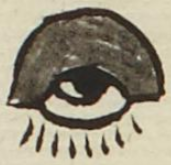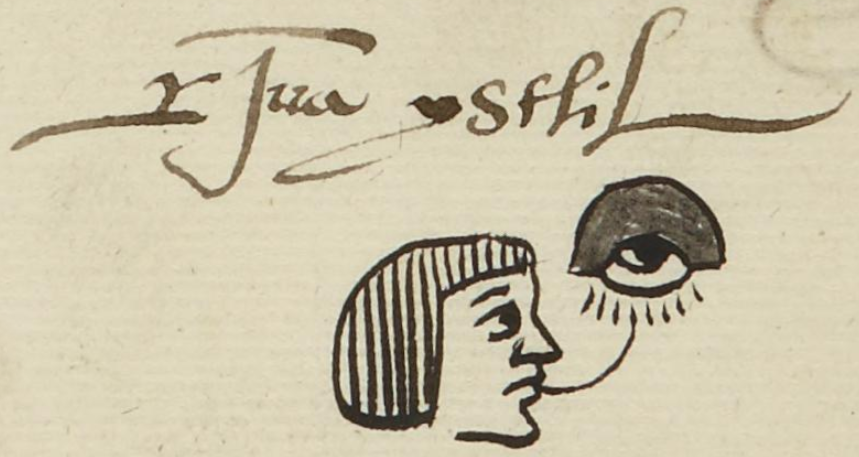Ixtlil (MH708v)
This black-line drawing of the compound glyph for the personal name Ixtlil (perhaps “Black Face”) is attested here as a man’s name. The glyph shows a European-style eye (ixtli) with a glint of light on the pupil and lower lashes below the eye. The eyelid is thick and black (tlilli).
Stephanie Wood
Ixtlil seems to mean more “Black Face” than “Black Eye,” but it could be either. This name seems to be short for Ixtlilton, “Little Black Face,” the name of a deity or divine force, also known as Tlaltecuin or Tlaltetecuini, "Earth-Stamper,” who, as we note in the Online Nahuatl Dictionary, “belonged with the Macuiltonaleque, the young solar deities who presided over flowers, feasting, singing, dancing, gaming, and painting and who bore the names of the five tonalpohualli (260-day religious divinatory calendar) days assigned to the south, with numerical coefficients of five (the number signifying ‘excess’). Their most prominent member was Macuilxochitl, ‘Five Flower.’" See: Fray Bernardino de Sahagún, Primeros Memoriales, ed. Thelma D. Sullivan, et al. (Norman: University of Oklahoma Press, 1997), 101.]
Stephanie Wood
1560
Jeff Haskett-Wood
ojos negros, pestañas, deidades, calendarios nombres de hombres

ix(tli), eye or face, https://nahuatl.wired-humanities.org/content/ixtli
tlil(li), black or ink, https://nahuatl.wired-humanities.org/content/tlilli
Ixtlilton, the name of a solar fertility divine force, https://nahuatl.wired-humanities.org/content/ixtlilton
ixtlilmaca, to have or wear (literally, to give) black paint on one's face, https://nahuatl.wired-humanities.org/content/ixtlilmaca
Ojo Negro
Stephanie Wood
Matrícula de Huexotzinco, folio 708v, World Digital Library, https://www.loc.gov/resource/gdcwdl.wdl_15282/?sp=495&st=image.
This manuscript is hosted by the Library of Congress and the World Digital Library; used here with the Creative Commons, “Attribution-NonCommercial-ShareAlike 3.0 License” (CC-BY-NC-SAq 3.0).






